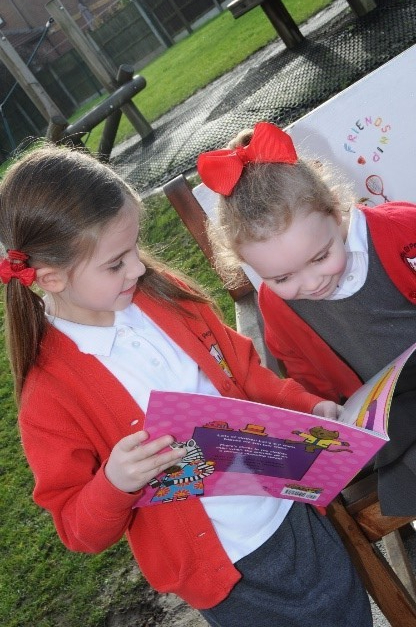Reading at Our Lady of Perpetual Help Catholic Primary School
We believe that every child will learn to read regardless of their background, needs, or abilities. We believe all pupils, including the weakest readers should make sufficient progress to meet or exceed Age Related Expectations (ARE).
Our Early Reading lead is Miss Briscoe. She monitors the provision of RWI and regularly carries out CPD sessions and team teaching. Miss Briscoe is also our Literacy lead and is responsible for delivering CPD throughout school.
The systematic, synthetic phonics programme that is taught throughout school is Read, Write Inc. This programme is carried through until at least the point where children can read almost all words fluently.
In nursery, we begin by exploring sounds in the environment therefore equipping children with the fundamental skills needed to read. Children have regular opportunities to hold books, to explore a variety of texts, to discuss books and listen to stories and rhymes that are well planned.
Children practise early reading with fully decodable books that are matched to the children’s phonetical knowledge. These books include a controlled, small number of ‘red’ words. The decoding of which has been specifically taught during RWI sessions. For children no longer on the RWI books, book bands are used as a way of ensuring that the children are accessing age-appropriate themes/material.
RWI is delivered by well trained teachers, HLTAs and TAs to groups of children. Groupings are based on the individual needs of each child. Progress is continually assessed using the RWI system and is tracked. There is close monitoring of children making the slowest progress to ensure that these children are able to keep up. Children experiencing significant difficulties are provided with individual support. Regular YARC assessments are used from Y1-Y6, this provides valuable information for identifying pupils needing additional intervention.
Every effort is made to ensure that parents feel confident in supporting their child’s first steps in learning to read. Parents are invited into school to observe the delivery of RWI so they are aware of our school’s systematic approach to the teaching of phonics. Parents are then signposted to the RWI videos on our school’s website where they can watch step by step tutorials on how to teach the different sounds.
Once the children have graduated from the RWI phonics programme, they apply their skills to the text-based English Mastery Programme. English Mastery is rooted in the use of high quality texts. Children study 3 whole-class texts per year which include classics. Each whole-class text is supplemented with a range of other fiction, non-fiction and poetry in order to provide children with a diverse range of reading opportunities. During these experiences, the children are asked to look for similarities and differences between characters, themes and settings etc. and often ‘magpie’ language for their own stories and writing. We also use supplementary texts to reinforce the children’s understanding of different genres.
The development of the children’s vocabulary plays a key role during English Mastery lessons. Vocabulary is selected from the class novel and is presented on a ‘Star Spelling bookmark’ and is displayed on our Working Walls. Time is spent exploring these words and the expectation is that this high-level vocabulary should be present in the children’s writing.
At the beginning of each English Mastery unit, we spend full sessions teaching reading skills, whether it is teaching inference skills; using evidence from the text to make reasonable predictions; teaching children to make comparisons within the text; training children how to accurately retrieve information and finally, how to summarise what they have read ensuring that key information is not lost. Even when we are not teaching an explicit reading session, reading remains at the heart of English Mastery. For example, if the lesson has a focus on developing punctuation, time is spent exploring examples from within the novel before the children compose their own. We also use the class novel to develop the children’s grammatical knowledge; this is taught in context to facilitate deep and meaningful learning.
In order to develop the children’s fluency, our school uses the ‘echo reading’ approach. The children spend time listening to their teacher modelling and then echo back the ways in which words have been stressed, using the same rate and intonation. Discussion then takes place as to why the teacher has made these particular choices and how this makes an impact on the reader. Older pupils then text mark to break the remaining text up into meaningful phrases using symbols.
All children, regardless of their ability, are given access to the same high-quality texts as their peers. Support and scaffolding ensure that all children can confidently participate in the lessons and make progress. Interventions such as ‘Inference training’ are in place to help the children to ‘keep up’ as well as ‘catch up’. Interventions are led by well-trained TAs and teachers. Groups are often fluid to accommodate the changing needs of the children and assessments are used to ensure that the interventions are having a positive impact on our learners.
Regularly reading aloud to our children is a whole-school priority. Books used are age appropriate in content but beyond the children’s own reading ability. Often, books selected are based on the children’s wider curriculum for example, WW2. Every effort is made to bring books to life through energetic and enthusiastic delivery. Children are given lots of opportunities to have discussions about books. Our school library has a wide range of high quality books and is open to both children and parents. Our weekly Reading club gives further opportunities to read for pleasure. Reading cafes give parents the opportunity to share books with their children in the school’s library.
Further information regarding our curriculum is available on the school’s website.

